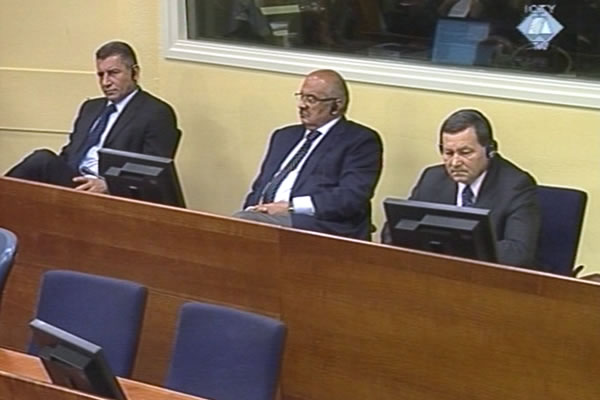Home
BRIONI TRANSCRIPTS ANALYZED
Judgment for the Croatian generals
What are the facts on which the Judge Orie and his Trial Chamber based their legal finding about the existence of a joint criminal enterprise to permanently eliminate Serbs from Krajina, headed by Croatian president Tudjman in the summer of 1995? Convicted generals Gotovina and Markac contributed significantly to the joint criminal enterprise, the judges found, unlike General Cermak who was acquitted
 Ante Gotovina, Ivan Cermak and Mladen Markac in the courtroom
Ante Gotovina, Ivan Cermak and Mladen Markac in the courtroom Last Friday, generals Ante Gotovina and Mladen Markac were sentenced to 24 and 18 years in prison respectively, while Ivan Cermak was acquitted of all charges. The judgment states there was a joint criminal enterprise to permanently eliminate Serbs from Krajina in the summer of 1995. This finding is based on an analysis of the preparations for Operation Storm. The ‘central element’ of the planning, the judgment notes, was the meeting of President Tudjman with the Croatian military leadership in Brioni, on 31 July 1995. The Trial Chamber devoted a chapter in the judgment to an analysis of the course of the meeting and gave its view of the prosecution allegation that the plan "to permanently and forcibly remove the Krajina Serbs was crystallised" at the meeting.
According to the Brioni transcripts, admitted as prosecution exhibit P-461, President Tudjman defined the agenda as follows: ‘to inflict such blows that the Serbs will [for] all practical purposes disappear, that is to say, the areas we do not take at once must capitulate within a few days’. The prosecution argued that Tudjman envisaged ‘disappearance for all practical purposes’ of the SVK and Serb civilians. The Trial Chamber rejected this claim, noting that the Croatian president continued his intervention by saying, ‘to inflict such powerful blows in several directions that the Serbian forces will no longer be able to recover, but will have to capitulate’. As the Trial Chamber concluded, it was clear that the ‘disappearance for all practical purposes’ referred mostly to the Serb military forces, not civilians.
However, the judges found that in other statements made by Tudjman and other persons at the meeting about what should happen to ‘Serbs’ it was less clear whether they refer to the army or civilians. The judgment quotes Tudjman’s words that it was 'important to leave a way out for the civilians, because the army would follow them, and when the columns set out, they will have a psychological impact on each other’. General Gotovina answers, ‘a large number of civilians are already evacuating Knin and heading towards Banja Luka and Belgrade. That means that if we continue this pressure, probably for some time to come, there won’t be so many civilians just those who have to stay, who have no possibility of leaving'. As the meeting progressed, the participants say that the Serbs’ human rights should be guaranteed publicly while at the same time, Serbs should be shown a way out of Krajina. Tudjman’s words, ‘so in that way, to give them a road, while ostensibly guaranteeing them civil rights’ were analyzed in great detail in the judgment.
The Trial Chamber also considered if the opening of a corridor for the Serb civilians to leave Krajina was motivated by a desire to avoid civilian casualties in the military operation or to reduce them to a minimum. Some defense witnesses, like former Croatian foreign minister Mate Granic, had put forth this argument. The judges didn’t find anything in the Brioni transcripts to corroborate this claim. The judgment says that the participants at the meeting didn’t speak at all about how to conduct a military operation to minimize civilian casualties. On the contrary, in an exchange Tudjman speaks about launching an artillery attack on Knin ‘for complete demoralization’, under the pretext of a Serb counter-attack. Gotovina answers that ‘Knin could be destroyed in a few hours’. The president also speaks about the need to avoid the shelling of the UN barracks but said nothing about the civilian targets in Knin.
Analyzing them side by side, the Trial Chamber decided that all those statements referred primarily if not exclusively to civilians. The defense argument that Tudjman, as an old-school communist, talked about ‘ostensible human rights’ and not about ‘ostensible guarantees’ was rejected. According to the judges, things wouldn’t be much more different if the word ‘ostensible’ referred to human rights, because the two concepts – human rights guarantees and ‘showing them a way out’– are irreconcilable. Because, as the judgment finds, ‘guaranteeing them civil rights [...] would require the Serbs to stay’.
All this, the Trial Chamber found, was an expression of the true intent of the participants of the Brioni meeting "to show Serbs out but at the same time give them the impression that they could stay".
Linked Reports
- Case : Gotovina et al. - "Operation Storm"
- 2011-04-15 GOTOVINA SENTENCED TO 24 YEARS, MARKAC TO 18, CERMAK WALKS FREE
- 2011-03-22 GOTOVINA DOESN’T WANT THE EUROPEAN MONITORS’ REPORTS TO REMAIN UNDER SEAL
- 2011-03-18 PUBLIC ASPECT OF CONFIDENTIAL DOCUMENTS
- 2011-04-19 TUDJMAN’S ATTITUDE TO SERBS
- 2011-04-20 DISCRIMINATORY LAWS AFTER THE OPERATION STORM
- 2011-04-21 ’LIMITED RESULTS’ OF INVESTIGATIONS INTO CRIMES AFTER OPERATION STORM
